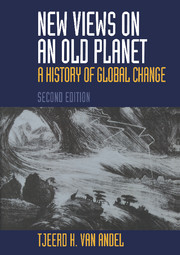Book contents
- Frontmatter
- Contents
- Preface
- Acknowledgments
- At the start
- Foundations
- Climate past and present: the Ice Age
- Drifting continents, rising mountains
- Changing oceans, changing climates
- The four-billion-year childhood
- Life, time, and change
- 16 Beyond Darwin
- 17 Bones of our ancestors
- 18 Evolution and environment
- 19 Crises and catastrophes
- Epilogue
- Glossary
- Sources of illustrations
- Index
16 - Beyond Darwin
Published online by Cambridge University Press: 05 June 2012
- Frontmatter
- Contents
- Preface
- Acknowledgments
- At the start
- Foundations
- Climate past and present: the Ice Age
- Drifting continents, rising mountains
- Changing oceans, changing climates
- The four-billion-year childhood
- Life, time, and change
- 16 Beyond Darwin
- 17 Bones of our ancestors
- 18 Evolution and environment
- 19 Crises and catastrophes
- Epilogue
- Glossary
- Sources of illustrations
- Index
Summary
In 1859 Charles Darwin published The Origin of Species, a work unique in science for its impact on the spirit of its time and of all times following. Darwin's thesis was startling, although not wholly novel, and it continues to evolve as our understanding of biological mechanisms continues to deepen. It has retained its grip on an overwhelmingly favorable public attention for a century and a half, but the opposition has been as persistent as the concept itself. Ideas of equal importance and sometimes even more directly relevant to the human condition have not always weathered so well.
The theory of evolution is simple, straightforward in its premises, and direct in its consequences. More than a century of biological and paleontological research has added refinement and depth, but has not clouded its basic structure. Virtually all scientists today accept it as true. Lately, some of its aspects have been vigorously debated and new, supplementary ideas have sprouted, but it is a debate of renewal, not rebellion.
Although the concept of evolution touches our lives in many ways, it has been not so much its scientific content that has been troubling as its philosophical consequences. Foremost among the consequences is the realization that, if evolution is really the product of a random selection of variants created by random processes, it is a deeply materialistic concept, leaving no room for loftier views.
- Type
- Chapter
- Information
- New Views on an Old Planet , pp. 315 - 330Publisher: Cambridge University PressPrint publication year: 1994

